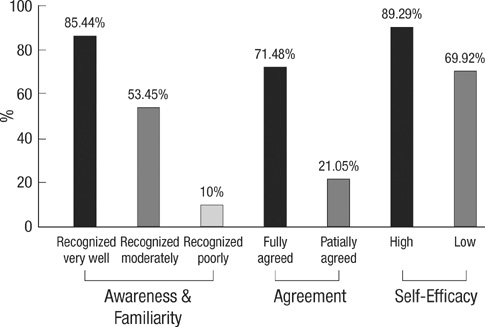J Korean Med Sci.
2010 Nov;25(11):1568-1573. 10.3346/jkms.2010.25.11.1568.
A Comprehensive Model of Factors Affecting Adoption of Clinical Practice Guidelines in Korea
- Affiliations
-
- 1Department of Health Services Management, Kyung Hee University, Seoul, Korea.
- 2Department of Preventive Medicine, School of Medicine, Graduate School of Ewha Womans University, Seoul, Korea. lsh0270@ewha.ac.kr
- 3Department of Medical Sciences, Graduate School of Ewha Womans University, Seoul, Korea.
- 4Korean Academy of Medical Sciences, and College of Medicine, Chung-Ang University, Seoul, Korea.
- 5Korean Academy of Medical Sciences, and College of Medicine, Kyung Hee University, Seoul, Korea.
- KMID: 1779225
- DOI: http://doi.org/10.3346/jkms.2010.25.11.1568
Abstract
- This study aims to investigate the factors related to the adoption of clinical practice guidelines in clinical settings in Korea; it also aims to determine how these factors differ depending on the specific situation of health care system and professional climate. The research sample comprised physicians who are board members of academic societies with experiences in development of clinical practice guidelines using a convenient sampling. We analyzed 324 physicians with pooling two-year sample of 2007 and 2008. From all the respondents, 48.8% stated that they followed Clinical Practice Guidelines, and 93.4% agreed with the content in the Clinical Practice Guidelines. With regard to the item on the self-efficacy of practicing guidelines, 90.3% of the respondents selected 'low level'. In the regression analysis, the factors associated with implementation were level of recognition, agreement and self-efficacy and positive attitude towards practice guidelines. Although the health care system in Korea differs from those in Western countries, our results revealed that the factors related to the adoption of practice guidelines were similar to the research results of Western countries. These results suggest that professionals' attitudes towards clinical practice guidelines are universal, and implementation strategies should be developed globally.
Keyword
MeSH Terms
Figure
Reference
-
1. Wolff M, Bower DJ, Marbella AM, Casanova JE. US family physicians' experiences with practice guidelines. Fam Med. 1998. 30:117–121.2. Drake RE, Goldman HH, Leff HS, Lehman AF, Dixon L, Mueser KT, Torrey WC. Implementing evidence-based practices in routine mental health services settings. Psychiatr Serv. 2001. 52:179–182.3. Grimshaw JM, Russell IT. Effect of clinical guidelines on medical practice: a systematic review of rigorous evaluations. Lancet. 1993. 342:1317–1322.
Article4. Burgers JS, Grol R, Klazinga NS, Mäkelä M, Zaat J. ACREE Collaboration. Towards evidence-based clinical practice: an international survey of 18 clinical guideline programs. Int J Qual Health Care. 2003. 15:31–45.
Article5. Flores G, Lee M, Bauchner H, Kastner B. Pediatricians' attitudes, beliefs, and practices regarding clinical practice guidelines: a national survey. Pediatrics. 2000. 105:496–501.
Article6. Scott IA, Buckmaster ND, Harvey KH. Clinical practice guidelines: perspectives of clinicians in Queensland public hospitals. Intern Med J. 2003. 33:273–279.
Article7. Farquhar CM, Kofa EW, Slutsky JR. Clinicians' attitudes to clinical practice guidelines: a systematic review. Med J Australia. 2002. 177:502–506.
Article8. Mottur-Pilson C. Internists' evaluation of guidelines: the IMCARE Practice Guidelines Network. Int J Qual Health Care. 1995. 7:31–37.
Article9. Tunis SR, Hayward RS, Wilson MC, Rubin HR, Bass EB, Johnston M, Steinberg EP. Internists' attitudes about clinical practice guidelines. Ann Intern Med. 1994. 120:956–963.
Article10. Graham ID, Beardall S, Carter AO, Tetroe J, Davies B. The state of the science and art of practice guideline development, dissemination and evaluation in Canada. J Eval Clin Pract. 2003. 9:195–202.11. Dickey B, Normand SL, Eisen S, Hermann R, Cleary P, Cortés D, Ware N. Associations between adherence to guidelines for antipsychotic dose and health status, side effects, and patient care experiences. Med Care. 2006. 44:827–834.
Article12. Inouye J, Kristopatis R, Stone E, Pelter M, Sandhu M, Weingarten S. Physicians' changing attitudes toward guidelines. J Gen Intern Med. 1998. 13:324–326.
Article13. Cabana MD, Rand CS, Powe NR, Wu AW, Wilson MH, Abboud PA, Rubin HR. Why don't physicians follow clinical practice guidelines? A framework for improvement. JAMA. 1999. 282:1458–1465.
Article14. Cabana MD, Flores G. The role of clinical practice guidelines in enhancing quality and reducing racial/ethnic disparities in paediatrics. Paediatr Respir Rev. 2002. 3:52–58.
Article15. Cabana MD, Kim C. Physician adherence to preventive cardiology guidelines for women. Women's Health Issues. 2003. 13:142–149.
Article16. Cabana MD, Rand CS, Becher OJ, Rubin HR. Reasons for pediatrician nonadherence to asthma guidelines. Arch Pediatr Adolesc Med. 2001. 155:1057–1062.
Article17. Rosser WW, Palmer WH. Dissemination of guideline on cholesterol. Canadian Family Physician. 1993. 39:280–284.18. Wechsler H, Levine S, Idelson RK, Rohman M, Taylor JO. The physician's role in health promotion- a survey of primary care practiotioners. N Engl J Med. 1983. 308:97–100.19. Ammerman AS, DeVellis RF, Carey TS, Keyserling TC, Strogatz DS, Haines PS, Simpson RJ Jr, Siscovick DS. Physician-based diet counseling for cholesterol reduction: current practices, determinants, and strategies for improvement. Prev Med. 1993. 22:96–109.
Article20. Lomas J, Anderson GM, Domnick-Pierre K, Vayda E, Enkin MW, Hannah WJ. Do practice guidelines guide practice? The effect of a consensus statement on the practice of physicians. N Engl J Med. 1989. 321:1306–1311.21. Mittman BS, Tonesk X, Jacobson PD. Implementing clinical practice guidelines: social influence strategies and practitioner behavior change. QRB Qual Rev Bull. 1992. 18:413–422.
Article22. Main DS, Cohen SJ, DiClemente CC. Measuring physician readiness to change cancer screening: preliminary results. Am J Prev Med. 1995. 11:54–58.
Article23. Meyers DG, Steinle BT. Awareness of consensus preventive medicine practice guidelines among primary care physicians. Am J Prev Med. 1997. 13:45–50.
Article24. Hayward RS, Guyatt GH, Moore KA, McKibbon KA, Carter AO. Canadian physicians' attitudes about and preferences regarding clinical practice guidelines. CMAJ. 1997. 156:1715–1723.
- Full Text Links
- Actions
-
Cited
- CITED
-
- Close
- Share
- Similar articles
-
- Development of Evidence based Nursing Practice Guideline Document Model for Electronic Distribution
- Factors Affecting Nursing Students' Activeness in Clinical Education
- Application of radiotherapy for hepatocellular carcinoma in current clinical practice guidelines
- A Study on the Influencing Factors of Women's Adoption of Sterilization
- 2021 Clinical Practice Guidelines for Diabetes Mellitus in Korea


